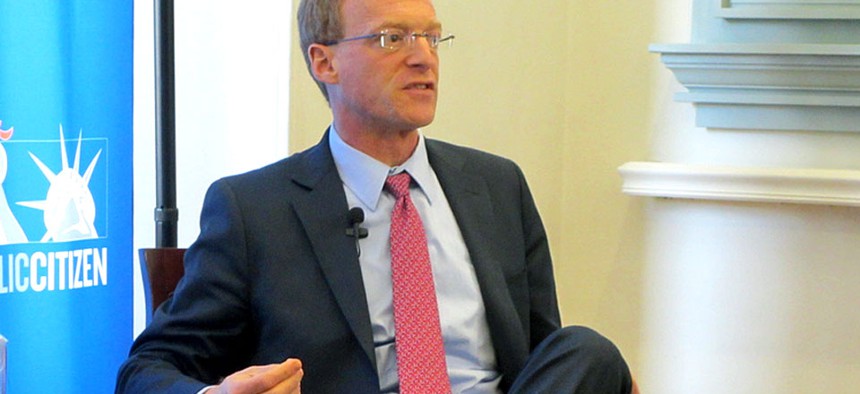
Howard Shelanski, administrator of the Office of Information and Regulatory Affairs Flickr user Public Citizen
Obama’s Regulatory Chief: Businesses Will Always Criticize Us
Shelanski assures progressive groups OIRA doesn't dictate agency policy.
Despite the Obama administration’s vow to apply “common sense” safeguards against agency rules that are too burdensome, the business community “will always be critical of regulations when there is a cost,” the head of the White House regulatory office said on Monday.
Howard Shelanski, administrator of the Office of Information and Regulatory Affairs, told an audience of sometimes-skeptical progressives at the headquarters of Public Citizen that “President Obama clearly wants to help the environment and protect health, safety and welfare, while consulting with business.”
The administration’s rules thus far have a net benefit of $159 billion, with another $25 billion expected this year, Shelanski said. “These are good things for society, and are a good thing for business over the long haul,” he said.
OIRA, said Public Citizen President Robert Weissman, “is often seen as only weakening proposed regulations, not strengthening them.”
Shelanski countered that “our job is to review -- not to tell an agency -- the policy, and agencies decide which areas to regulate.” But, “once the agency goes down a path and it has major economic impact,” he said, his staff of 45 “works with them on how to comply with statutes and executive orders going back five administrations.” The most important thing his office does is to “convene the interagency community” to look for duplication and contention among agencies, he said. “A lot of agencies work on these rules for a long time” and may not be aware of how they affect other agencies, Shelanski added.
Though contact with the West Wing is normal, he said, given the interest the White House has in any major regulatory initiative, OIRA’s job is to publish the unified agenda of planned regulations to make the agenda transparent, so that advocates, unions, private stakeholders and businesses have an opportunity to weigh in when the time is right.
Out of 3,500 rules listed in the agenda published each spring and fall, only 500 to 700 are significant enough to warrant OIRA’s attention, he said. “We’re not in a position to say, ‘This science isn’t very good,’ but we will ask agencies whether the paper the rule is based on has been read correctly.”
There’s a misconception, Shelanski said, that OIRA is cranking out more rules as part of its regulatory look-back initiative and paperwork modernization efforts begun under his predecessor, Cass Sunstein. “But a new or existing regulation may be designed to improve, not always repeal,” a rule that may be outdated or burdensome.
For example, a new rule relieves truck drivers of the need to file a “nonincident” report when nothing untoward took place on a trip. The full value of a cost-benefit analysis, Shelanski added, is not always to produce numbers that could have a legal bearing on a rule’s fate.
Sometimes, the costs are quantifiable and the benefits less so, he added. Rules under the 2003 Prison Rape Elimination act have a cost associated with them, but “the indirect benefit is not having a barbaric prison system, and we simply see if the rule is designed to achieve it.” The Defense Department’s new rules on benefits for same-sex couples are another example of regulations with abstract benefits, he said.
OIRA also asks agencies to consider less-burdensome regulatory alternatives, he said. “We might say, ‘Why not include an explanation that makes sense, or why not put this out for public comment?’ There’s always someone in an agency who doesn’t want to do it.”
But in general, “overruling or overriding a well-reasoned policy of an agency is not something we have done,” Shelanski said. “We’re not channeling some independent policy outcome.”
NEXT STORY: Are You a Dictator?







